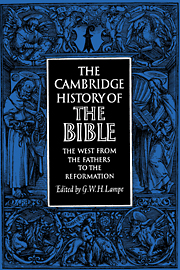Book contents
- Frontmatter
- I The Old Testament: Manuscripts, Text and Versions
- II The History of the Text and Canon of the New Testament to Jerome
- III Early Christian Book-Production: Papyri and Manuscripts
- IV Jerome
- V The Medieval History of the Latin Vulgate
- VI The Exposition and Exegesis of Scripture
- VII The ‘People's Bible’: Artists and Commentators
- VIII Bible Illustration in Medieval Manuscripts
- IX The Vernacular Scriptures
- X Erasmus in Relation to the Medieval Biblical Tradition
- Bibliography
- Notes on the Plates
- Index
- References
IV - Jerome
Published online by Cambridge University Press: 28 March 2008
- Frontmatter
- I The Old Testament: Manuscripts, Text and Versions
- II The History of the Text and Canon of the New Testament to Jerome
- III Early Christian Book-Production: Papyri and Manuscripts
- IV Jerome
- V The Medieval History of the Latin Vulgate
- VI The Exposition and Exegesis of Scripture
- VII The ‘People's Bible’: Artists and Commentators
- VIII Bible Illustration in Medieval Manuscripts
- IX The Vernacular Scriptures
- X Erasmus in Relation to the Medieval Biblical Tradition
- Bibliography
- Notes on the Plates
- Index
- References
Summary
An outline of Jerome's life will help to indicate his place in history and also some of the influences to which he was subjected and which have left their mark on his biblical work. Much effort has been devoted to establishing his chronology, but as the evidence consists largely in the rather vague remarks contained in his writings the dates assigned are in part only approximate, and even today there is no complete agreement among scholars. The dates accepted here are those of F. Cavallera, except that the date of Jerome's death should perhaps be 420 and not 419, the date given by that biographer. The date of his birth is at the latest 347, and may have been a year or two earlier.
Jerome was born at Stridon on the borders of Pannonia and Dalmatia, not far from Aquileia at the head of the Adriatic. This place is mentioned nowhere except in the last section of Jerome's De Viris Illustribus; it was destroyed in an invasion of the Goths, and its very site is today a matter of speculation. His parents were Christian, but apparently not particularly zealous in their attachment to their religion. They were in easy circumstances, and after his early education in his native place they were able to send their son to Rome at the age of about twelve for further studies. Here he was fortunate enough to have the celebrated grammarian Donatus as his teacher. Under his tuition Jerome gave himself ardently to the study of the great classical writers.
- Type
- Chapter
- Information
- The Cambridge History of the Bible , pp. 80 - 101Publisher: Cambridge University PressPrint publication year: 1969
References
- 3
- Cited by

